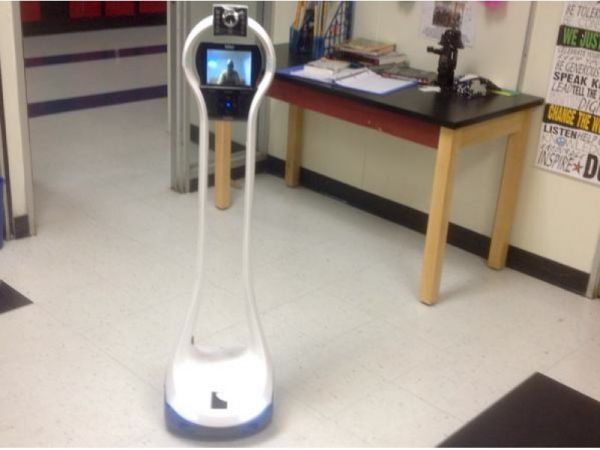
Eighth-grader Sebastian Quinn is battling Hodgkin's disease, but still going to school thanks to pilot program robot.
A student's eighth grade year comes with plenty of pressure, not the least of which includes social life and the impending hysteria that is high school life. For Sebastian Quinn, a student at Black River Middle School in Chester, he's taking it all in stride – or glide. In the summer of 2014, Quinn was diagnosed with Hodgkin's Disease. Because of ongoing treatments and the need to coalesce, Quinn was forced to make Goryeb Children's Hospital in Morristown his home away from home for an extended period of time. But he didn't want to miss school, and thanks to modern technology, he's in Chester most of the week, while remaining in Morristown. A few days a week Quinn attends school via mobile robot. A four-foot tall, sleek, white robot called VGo rolls around the halls of the middle school, controlled remotely by Quinn from Goryeb. A fixed camera allows Quinn to see his surroundings, classmates, and teachers, and a digital screen let's everyone see their buddy Sebastian.
"He just rolls himself in and goes to his spot in the room, like any student would go to their seat," said Quinn's math teacher Krista Maico. "Other students will come to him for group exercises and he'll hold up his answers to questions that we can all see. It's really all been seamless."
That seamless transition was thanks, in large part, to the school's IT professionals Chris McManus and Anthony Rivers, who helped set up the VGo and get Quinn moving. The eighth grader began the school year attending school through a Google Chromebook and using Skype or Google Hangout to be part of the classroom. "But that became cumbersome and wasn't practical," McManus said. "Students had to carry the laptop through the hallways still open so the connection wouldn't be lost, and Sebastian only had a single view of the room. Now he's free to go where he wants when he wants and see what's going on all around him."
While the screen that everyone at Black River is viewing Quinn on is of high quality, McManus said on the other, Quinn's view is "astonishing."
Pilot Program
The VGo doesn't exactly have the omnipresence of a smartphone, and is currently in a pilot program at Black River because of its high-powered IT infrastructure. It also took a chance meeting at a holiday party between representatives of two major nonprofits to get Quinn back into school using the product. Joann Spera, the education liaison for the Valerie Fund, based in Maplewood, helped connect Executive Director Barry Kirschner and Allen Gallorenzo, founder of the Daniel Gallorenzo Foundation. When Spera explained the impacts a VGo could have in a school with Black River's infrastructure, Gallorenzo asked Kirschner if his foundation could fund the nearly $7,000 payment through the Valerie Fund to get Quinn back inside the school building.
"We know how important it is to connect these kids," Kirschner said. "We knew we had to make this happen. How can we say no, as an organization, to keep kids away from school? It was a no-brainer." The Valerie Fund, which dispersed $172,000 in scholarships in 2014, is working to create more opportunities for kids who are unable to be in class fulltime. "We want to have these to happen at other schools, Kirschner said. "Wherever feasible, we'll have these."
So while Quinn patiently battles Hodgkin's disease, his experience with the VGo is just the beginning for what could transform the educational opportunities for homebound or hospital-bound students.
Back to News Main Page